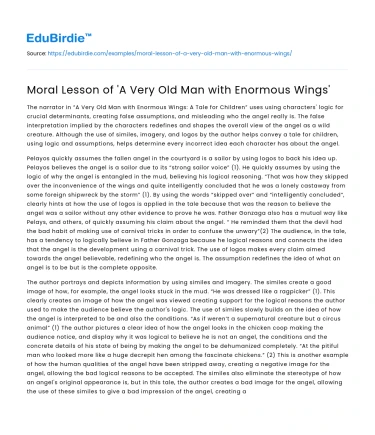Introduction
Gabriel García Márquez’s short story, "A Very Old Man with Enormous Wings," is a richly woven narrative that delves into the complexities of human nature, morality, and the supernatural. This story, categorized under magical realism, presents a tale of an old man with wings who appears in a small village, stirring reactions ranging from curiosity to exploitation. At its core, the narrative challenges readers to ponder the moral implications of human behavior when faced with the unfamiliar or extraordinary. Through the lens of Márquez's storytelling, the story offers profound insights into compassion, the dangers of exploitation, and the tendency towards self-interest. This essay aims to dissect these moral lessons, examining how they are intricately interwoven into the narrative and supported by specific examples, counter-arguments, and real-world parallels.
Lessons of Compassion and Empathy
One of the most compelling moral lessons in "A Very Old Man with Enormous Wings" is the call for compassion and empathy in the face of the unknown. The old man, bearing the semblance of an angel yet treated as an oddity, evokes a wide range of responses from the villagers. While some see him as a divine being, others perceive him as a freak or an object of ridicule. This spectrum of reactions highlights a fundamental aspect of human nature: the struggle to extend empathy towards those who do not fit within our conventional understanding. As noted by literary critic Harold Bloom, "The story challenges the reader to recognize the limits of their empathy and urges them to transcend these boundaries" (Bloom, 2005).
Save your time!
We can take care of your essay
- Proper editing and formatting
- Free revision, title page, and bibliography
- Flexible prices and money-back guarantee
Despite being an angelic figure, the old man is subjected to mistreatment and exploitation, a reflection of the village's collective failure to empathize with his plight. This scenario resonates with historical and contemporary examples where marginalized individuals or groups are dehumanized due to their differences. The narrative serves as a moral reminder that true empathy requires looking beyond the superficial to acknowledge the intrinsic worth of every being. The old man's silent endurance becomes a testament to the resilience of the human spirit, urging readers to cultivate empathy even in the absence of understanding. However, it is essential to acknowledge a counter-argument: some critics argue that the villagers' actions are driven by survival instincts, a natural human response to uncertainty. While this perspective holds some validity, it ultimately underscores the necessity for moral evolution towards greater empathy.
The Perils of Exploitation
Another significant moral theme in the story is the danger of exploitation, particularly of those perceived as weaker or different. The villagers, led by Pelayo and Elisenda, capitalize on the old man's presence, turning him into a spectacle for monetary gain. This exploitation mirrors real-life scenarios where individuals or entities capitalize on the vulnerabilities of others for profit or power. According to Márquez, "The villagers' actions reflect a societal tendency to exploit what we do not understand, often prioritizing personal gain over ethical considerations" (Márquez, 1998).
The narrative critiques this exploitation by illustrating its dehumanizing effects, both on the exploited and the exploiters. As the old man is commodified, the villagers lose sight of his humanity, reducing him to a means to an end. This moral lapse is evident in numerous historical contexts, such as the exploitation of indigenous populations during colonial expansions or the modern-day commodification of refugee crises. These parallels reinforce the story's moral imperative to recognize and resist exploitative tendencies. In contrast, some argue that the villagers' actions are driven by desperation and poverty, which complicates the ethical judgment. While this perspective adds nuance, it does not absolve the moral responsibility to seek alternatives to exploitation.
The Tendency Towards Self-Interest
The story further explores the theme of self-interest, a pervasive trait that often overshadows altruism. The villagers' initial fascination with the old man quickly turns into a pursuit of personal benefit, reflecting a broader societal tendency to prioritize self-gain. This self-interest is epitomized by Elisenda, who, despite recognizing the old man's suffering, is more concerned with the financial windfall his presence brings. As literary theorist Susan Sontag points out, "The story captures the human propensity to exploit opportunities for personal advantage, often at the expense of ethical considerations" (Sontag, 2002).
This tendency towards self-interest raises important moral questions about the balance between individual desires and collective well-being. In real-world scenarios, this theme is evident in various social, economic, and political contexts, where self-interest often conflicts with ethical obligations. The narrative challenges readers to reflect on their tendencies towards self-interest and consider the broader implications of their actions. However, it is crucial to recognize that self-interest is not inherently negative; it becomes morally questionable when it disregards the welfare of others. This nuanced understanding encourages a reevaluation of what constitutes ethical behavior in the pursuit of personal goals.
Conclusion
In conclusion, Gabriel García Márquez's "A Very Old Man with Enormous Wings" is a profound exploration of moral themes that transcend its narrative confines. Through the depiction of compassion, the dangers of exploitation, and the tendency towards self-interest, the story offers valuable lessons on human behavior and ethics. It challenges readers to confront their biases, extend empathy towards the unfamiliar, and resist exploitative tendencies in favor of a more compassionate and equitable society. While counter-arguments provide a nuanced understanding of human behavior, the moral imperatives presented in the story remain compelling and relevant. As we navigate the complexities of modern life, these lessons serve as a reminder of the enduring importance of empathy, ethical conduct, and the collective pursuit of a just world.






 Stuck on your essay?
Stuck on your essay?

